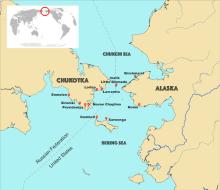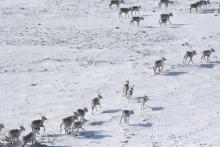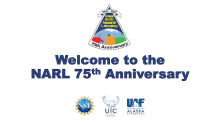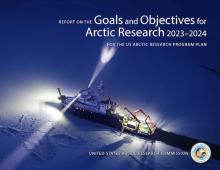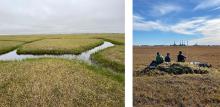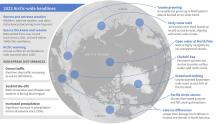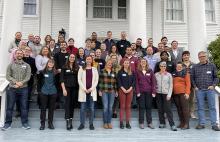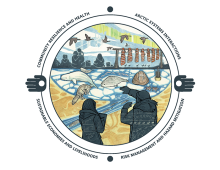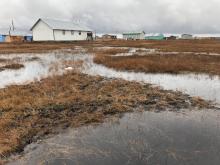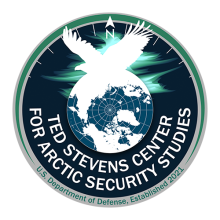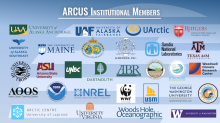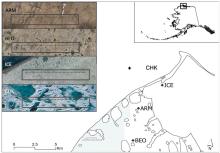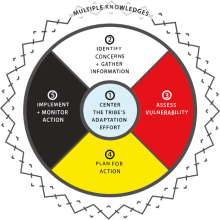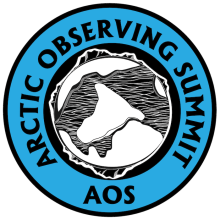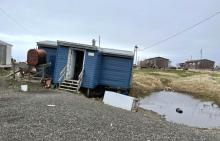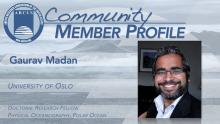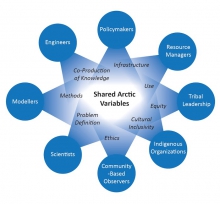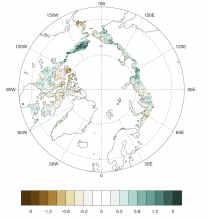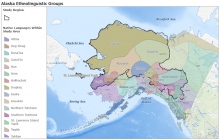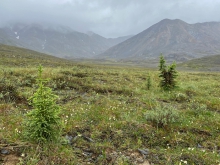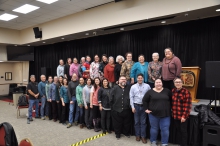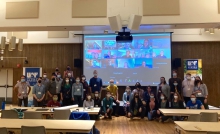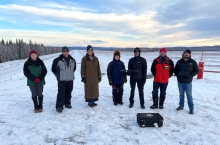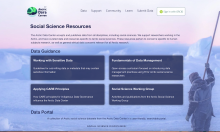Witness Community Highlights is a blog series featuring stories written by members of the Arctic research and Indigenous knowledge communities. Each post offers a brief look at projects, ideas, and collaborations shaping work in and about the Arctic.
Reflections on a Recent Conference Session: Alaskan and Arctic Anthropology Since Russia's Invasion of Ukraine
Since Russia's invasion of Ukraine on 24 February 2022, ethnographic research in Chukotka has not been possible. A recent conference session was organized to focus on the direct relevance that the suffering and displacement of millions of people in Ukraine and in Chukotka has for Arctic social sciences. Although the war and Putin's regime will eventually come to an end, the future of the social science research in Russia has possibly reached a "turn of no return" due to the fact that hundreds of Indigenous hunters, reindeer herders, culture, language, and knowledge bearers will be gone.
By: Sveta Yamin-Pasternak, Department of Anthropology, University of Alaska Fairbanks and Igor Pasternak, Department of Art, University of Alaska Fairbanks
Caribou Migrations in a Changing Arctic
In early August 2022, a multidisciplinary, intergenerational, and cross-cultural group of more than 140 participants converged on Utqiaġvik, Alaska to celebrate the 75th Anniversary of the Naval Arctic Research Laboratory (NARL) and to take part in an NSF funded workshop focused on Enhancing Arctic Science and Engineering. The workshop, grounded in a legacy of promoting sustainable Arctic science in Utqiaġvik, was guided by the important role of the Iñupiat in furthering scientific understanding of climatic and social-ecological change in the rapidly changing Arctic. The post-workshop report will help plan for the coordination of future Arctic research efforts and identify logistical and facility needs.
By: Kyle Joly, Wildlife Biologist, National Park Service
Celebrating 75 Years of Arctic Research in Utqiaġvik, Alaska
In early August 2022, a multidisciplinary, intergenerational, and cross-cultural group of more than 140 participants converged on Utqiaġvik, Alaska to celebrate the 75th Anniversary of the Naval Arctic Research Laboratory (NARL) and to take part in an NSF funded workshop focused on Enhancing Arctic Science and Engineering. The workshop, grounded in a legacy of promoting sustainable Arctic science in Utqiaġvik, was guided by the important role of the Iñupiat in furthering scientific understanding of climatic and social-ecological change in the rapidly changing Arctic. The post-workshop report will help plan for the coordination of future Arctic research efforts and identify logistical and facility needs.
By: Benjamin M. Jones, Institute of Northern Engineering, University of Alaska Fairbanks on behalf of the Workshop Organizing and Advisory Committee
USARC Releases Report on the Goals and Objectives for Arctic Research 2023–2024
The United States Arctic Research Commission has released its "Report on the Goals and Objectives for Arctic Research 2023–2024." The Report focuses on five goals: Environmental Risks and Hazards; Community Health and Well-Being; Infrastructure; Arctic Economics; and Research Cooperation. In addition, the Report emphasizes a cross-cutting theme of data analytics and informatics, considers the impact of COVID-19 on the Arctic region, and highlights select emerging topics in the region.
By: Isaac Edwards, Senior Counsel, United States Arctic Research Commission
New Observatory Supports Broader Understanding of Climate-Change and Infrastructure Impacts to Ice-Rich Permafrost Systems
The NSF Navigating the New Arctic project, titled "Landscape Evolution and Adapting to Change in Ice-Rich Permafrost Systems (NNA-IRPS)" seeks to develop a broader understanding of how Arctic landscapes and ecosystems are evolving under the combined influence of climate change and local sources of disturbance. The project team established ice-rich permafrost observatories to study ground-ice conditions in relation to surficial geology, vegetation, other geoecological features, and disturbances. The Roadside Ice-Rich Permafrost Observatory (RIRPO) and the Natural Ice-Rich Permafrost Observatory (NIRPO) are in the Prudhoe Bay Oilfield. Research at the new NIRPO site investigates what has happened in areas of the oilfield that are mainly affected by climate change in the absence of infrastructure.
By: Donald A. Walker, Alaska Geobotany Center, Institute of Arctic Biology, and Department of Biology and Wildlife, University of Alaska Fairbanks
The 2022 Arctic Report Card
The 2022 Arctic Report Card, released on 13 December 2022, provides an updated annual view into the state of the Arctic by checking in on key vital signs — eight defining elements of the Arctic's climate and environmental system. The report also includes a range of essays on critical and emerging topics across the Arctic, bringing into focus diverse collections of observations that help to assess the overall trajectory of Arctic change, highlighting an Arctic in transition.
By: Matthew L. Druckenmiller, National Snow and Ice Data Center and Cooperative Institute for Research in Environmental Sciences, University of Colorado Boulder; Rick Thoman, Alaska Center for Climate Assessment and International Arctic Research Center, University of Alaska Fairbanks; and Twila A. Moon, National Snow and Ice Data Center and Cooperative Institute for Research in Environmental Sciences, University of Colorado Boulder
International Arctic Coastal Networks Connecting in Connecticut
The International Arctic Coastal Network (IACN) retreat, held in Mystic, Connecticut in mid-October 2022, brought together 42 researchers from eight different countries to focus on the unprecedented climate and land use change issues impacting Arctic coasts and the communities located there. Future Arctic coastal system dynamics will challenge conventional wisdom impacting human decision-making and adaptation planning, impacts to cultural heritage resources and communities, and likely resulting in unforeseen social and environmental challenges. The IACN retreat promoted synergy across networks to address the scale and complexity of future challenges.
By: Benjamin Jones, University of Alaska Fairbanks
IARPC Releases Arctic Research Biennial Implementation Plan 2022—2024
IARPC has released a companion for the Arctic Research Plan 2022—2026. The new implementation plan outlines 90 deliverables centered around supporting research, creating products, and coordinating information sharing. Like the Arctic Research Plan, the Biennial Implementation Plan 2022—2024 focuses on improving community resilience and well-being, advancing scientific understanding of ongoing changes in the Arctic system, creating more sustainable economies and livelihoods, and improving risk management and hazard mitigation.
By: Liz Weinberg, Interagency Arctic Research Policy Committee (IARPC) Engagement Director
Permafrost Pathways Project: Advancing Just Strategies to Address Arctic Warming
Permafrost Pathways is an ambitious new project that brings together scientists, Arctic residents, Indigenous Knowledge holders, environmental justice and human rights experts, and climate policymakers to improve permafrost science in collaboration with the international scientific community, and to inform and develop adaptation and mitigation strategies to address the hazards of permafrost thaw. The project addresses monitoring and modeling gaps as well as potential adaptation strategies and equitable mitigation policy.
By: Sue Natali, Arctic Program Director and Senior Scientist at Woodwell Climate Research Center and Project Lead for Permafrost Pathways, and Brendan Rogers, Associate Scientist at Woodwell Climate Research Center and Project Co-Lead for Permafrost Pathways
Decadal Review of the Long-Term Ecological Research Program
The Fourth Decadal Review Report on the Long-Term Ecological Research (LTER) network was released publicly in June 2022. The report discusses the strengths and challenges of the LTER network, summaries of findings, and includes recommendations from the committee. The report states that, "After more than forty years of sustained support from NSF, the LTER program has become one of the most highly regarded and successful programs in ecology." Response to the report, approved by the LTER Executive Board in October 2022, summarizes recent progress and plans in four focal areas from the review: diversity, equity, inclusion, and justice; synthesis; human-environment interactions; and education and outreach.
Editor's note: Text is excerpted from the LTER Network Response to the Fourth Decadal Review Committee Report
The Ted Stevens Center for Arctic Security Studies — Newest Regional Center of the US Department of Defense
The Ted Stevens Center for Arctic Security Studies, a Department of Defense (DOD) Regional Center established by the Secretary of Defense in June 2021, is located on Joint Base Elmendorf-Richardson in Anchorage, Alaska. The mission of the Stevens Center is to build strong, sustainable, domestic and international networks of security leaders and to promote and conduct focused research to advance DOD security priorities in the Arctic that include addressing the impacts of climate change in the region. The range of activities, seminars, symposiums, and products produced in support of that mission are highlighted in this article.
By: Maj. Gen. (Ret.) Randy "Church" Kee, USAF, Senior Advisor, Arctic Security Affairs, Ted Stevens Center
ARCUS 2022 Annual Meeting and Institutional Member Updates
The ARCUS 2022 Annual Meeting, held virtually on 1 November, brought together members from the Arctic research and education community. Small group discussion were focused on a range of Arctic research-related themes. A report on the meeting discussions and recommendations is in development and will be made available to the broader Arctic community. ARCUS member institutions were invited to share updates on Arctic research activities. Links to those updates are provided in this article.
By: ARCUS Staff
SALVO: Monitoring Arctic Snowmelt and Changes in Albedo in Alaska
In spring of 2022, a Snow ALbedo eVOlution (SALVO) research team traveled to Utqiaġvik (formerly known as Barrow), Alaska to monitor snowmelt patterns and albedo trajectories on two tundra and two sea-ice sites. The team investigated the nature and differences in the melt mechanisms operating in these two environments, and their role as drivers of regional and global climate systems.
By: Serina Wesen, University of Alaska Fairbanks (UAF); Anika Pinzner, UAF; Matthew Sturm, UAF
Tribal Climate Adaptation Guidebook Now Provides Online Resources
The Tribal Climate Adaptation Guidebook, published as a PDF in 2018 and adapted to a website in 2022, supports Tribes in their efforts to prepare for climate change. The Guidebook provides a comprehensive framework for climate change adaptation planning that explicitly recognizes the distinct circumstances of Tribal governments, culture, and knowledge systems while highlighting exemplary efforts by Tribes to adapt to climate change. The Guidebook's framework includes considerations for integrating and protecting Traditional Knowledges throughout the adaptation planning process relying on the Guidelines for Considering Traditional Knowledges (TKs) in Climate Change Initiatives.
By: Sascha Petersen, Adaptation International
Arctic Observing Summit 2022: A Call to Action
The Arctic plays a critical role influencing and driving planetary change and is part of the global geopolitical system. As such, Arctic observing must contribute to and enhance existing global observing networks to support forecasting, planning, adaptation, mitigation, and the identification of emerging issues in the context of ongoing change. The 2022 Arctic Observing Summit (AOS) is a biennial event convened as part of the Sustaining Arctic Observing Networks (SAON) initiative to guide the design, coordination, and long-term operation of an international network of observing systems that improves our understanding of, and response to, Arctic change.
By: Alice C. Bradley, Williams College; Maribeth Murray, Arctic Institute of North America; Malgorzata Smieszek, Arctic University of Norway
Point Lay Permafrost
The Native Village of Point Lay (Kali) on the North Slope of Alaska has been identified as the second-most permafrost thaw-affected community in the state of Alaska. In June 2022 a team of physical scientists, social scientists, and engineers traveled to Point Lay to observe, study, and discuss the effects of thawing permafrost on homes and critical infrastructure in the village. The multi-disciplinary team learned from one another and shared their discipline-centric ideas and observations which allowed for a more robust transfer of knowledge to the community, regional governance bodies, and engineers coping with the combined effects of thawing permafrost, infrastructure, and climate change.
By: Benjamin Jones, University of Alaska Fairbanks (UAF); Jana Peirce, UAF; Billy Connor, UAF; Mikhail Kanevskiy, UAF; Yuri Shur, UAF; Tracie Curry, Northern Social-Environmental Research; Peppi Bolz, UAF; and Bill Tracey, Native Village of Point Lay
ARCUS Member Profile of Gaurav Madan
ARCUS Community Member Profiles highlight our individual members and member representatives. They are short, easy-to-read profiles to help the ARCUS community get to know one another and support connections across disciplines and perspectives. This article summarizes the featured Profile of Gaurav Madan, Doctoral Research Fellow at the University of Oslo. For more information, please download the attached Member Profile and the transcript of a related interview.
Supporting Arctic Food Sovereignty through Sustained, Coordinated Observations of Arctic Change
The Research Networking Activities for Sustained Coordinated Observations of Arctic Change (Arctic CoObs RNA), now in its third year, helps define and build linkages between observations serving local-scale needs of Arctic and Indigenous communities and broader scale regional and global observing frameworks. The project works in partnership with the Indigenous-led Food Sovereignty Working Group to identify benefits and essential variables central to Pacific Arctic Indigenous food security and sovereignty.
By: Maureen Biermann, International Arctic Research Center (IARC) at the University of Alaska Fairbanks (UAF); Margaret Rudolf, UAF; Victoria Qutuuq Buschman, UAF; Craig Chythlook, UAF; Hajo Eicken, IARC/IUAF; and Sandy Starkweather, US Arctic Observing Network
Puzzling Vegetation Trends in the Yukon-Kuskokwim Delta are Resolved in 40-year Climate Record
While the Arctic overall exhibits increasing vegetation productivity trends, Alaska’s Yukon-Kuskokwim Delta has appeared repeatedly as a notable region of declining trends. This has puzzled climate scientists for some time. A new 40-year analysis reveals an unmistakable long-term pattern of rising and falling vegetation productivity in the Yukon-Kuskokwim Delta and finds that spring sea-ice concentration is a low-frequency driver of vegetation productivity in that region.
By: Amy Sakura Hendricks, University of Alaska Fairbanks
New Project Connects Indigenous Knowledge and Western Science to Better Understand Impacts of Climate Change on Arctic Rivers
The Arctic Rivers Project, funded by the National Science Foundation's Navigating the New Arctic Program in 2020, is a five-year effort to improve understanding of how rivers, ice transportation corridors, fish, and communities might be impacted by and adapt to climate change. The project is guided by an Indigenous Advisory Council and focuses on Arctic rivers in Alaska and Canada and the Yukon River drainage.
By Keith Musselman, University of Colorado Boulder and the Institute of Arctic and Alpine Research
Satellite Observations Indicate a Boreal Forest Biome Shift is Underway
Researchers find emerging evidence that climate change is causing boreal trees and shrubs to expand along the cool northern margins of the boreal forest, while at the same time causing trees to become more stressed and die along the warm southern margins of the boreal forest. These dynamics could lead to a gradual northward shift in the geographic extent of the boreal forest biome, but the extent to which such changes are already underway remains unclear.
By: Logan Berner and Scott Goetz, Northern Arizona University
A Community Level and Strength-Based Approach to Suicide Prevention
The Alaska Native Collaborative Hub for Research on Resilience (ANCHRR), funded through the National Institute of Mental Health, is a network of Alaska Native leaders, social advocates, researchers, educators, and students working to change the narrative on suicide prevention and re-imagine Indigenous research partnership within an academic environment. The importance of community-level protection for suicide prevention is becoming clearer with the first phase of research, and the team is preparing to describe how the various kinds of community protection are maintained within communities, and how they work in the lives of young people.
By: Evon Peter, University of Alaska Fairbanks; Lisa Wexler, University of Michigan; Stacy Rasmus, Center for Alaska Native Health Research at the University of Alaska Fairbanks; James Allen, University of Minnesota Medical School in Duluth
Rethinking Scientific Meetings in a COVID World, an Example of the 16th International Circumpolar Remote Sensing Symposium
The 16th International Circumpolar Remote Sensing Symposium convened 16–20 May 2022 in Fairbanks, Alaska. The symposium offered both in-person and virtual attendance options and saw 102 registrants from 12 countries. The 49 oral presentations were given by both in-person and virtual attendees, who received continual technical support to enhance participation. Organizers made COVID-19 safety and mitigation a priority—creating a detailed mitigation plan and requiring all attendees to acknowledge it during registration.
By: Melissa K. Ward Jones, University of Alaska Fairbanks (UAF), Jessica Garron, (UAF), Benjamin M. Jones, (UAF), Helena Bergstedt (b.geos), Martha Raynolds, (UAF), Simon Zwieback, (UAF), and Gerald "JJ" Frost (ABR, Inc.)
Remote Uncrewed Aircraft System Inspection and Response Team Developed in Unalakleet, Alaska
A remote uncrewed aircraft system (UAS) inspection and response team was developed with funding through a grant from US Department of Homeland Security. The project was designed to train a set of UAS pilots in the remote, coastal, hub community of Unalakleet, Alaska to fly small UAS as a means to monitor climate change impacts, inform local decision-making, and support the US Coast Guard mission in western Alaska.
By: Jessica Garron, Deputy Director of the Alaska Climate Adaptation Science Center and Research Assistant Professor with the International Arctic Research Center; John Henry, Jr., Deputy Director of the Native Village of Unalakleet; and Margaret Hall, Assistant Director of the Model Forest Policy Program
Springtime at the Arctic Data Center
As the Arctic Data Center enters its seventh year of operation, the staff is busy developing and teaching data management courses, collaborating on workshops and Arctic-related projects, and creating new resources for the Arctic social science research community.
By: Natasha Haycock-Chavez, Community Engagement and Outreach Coordinator, Arctic Data Center


